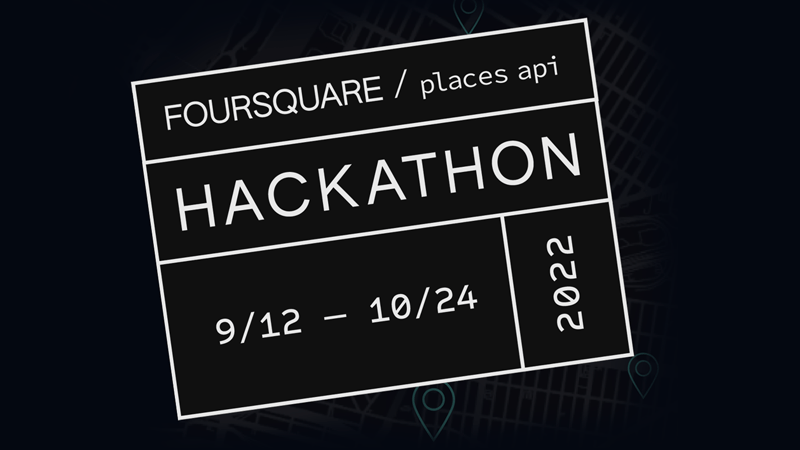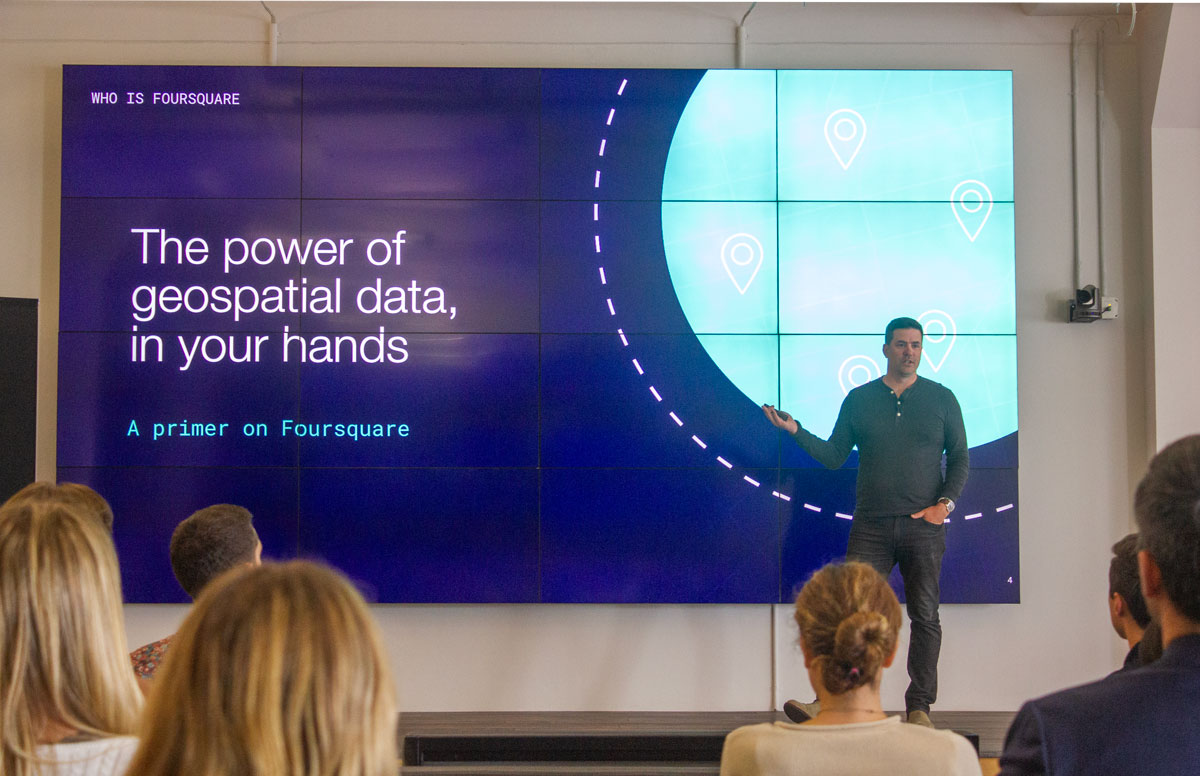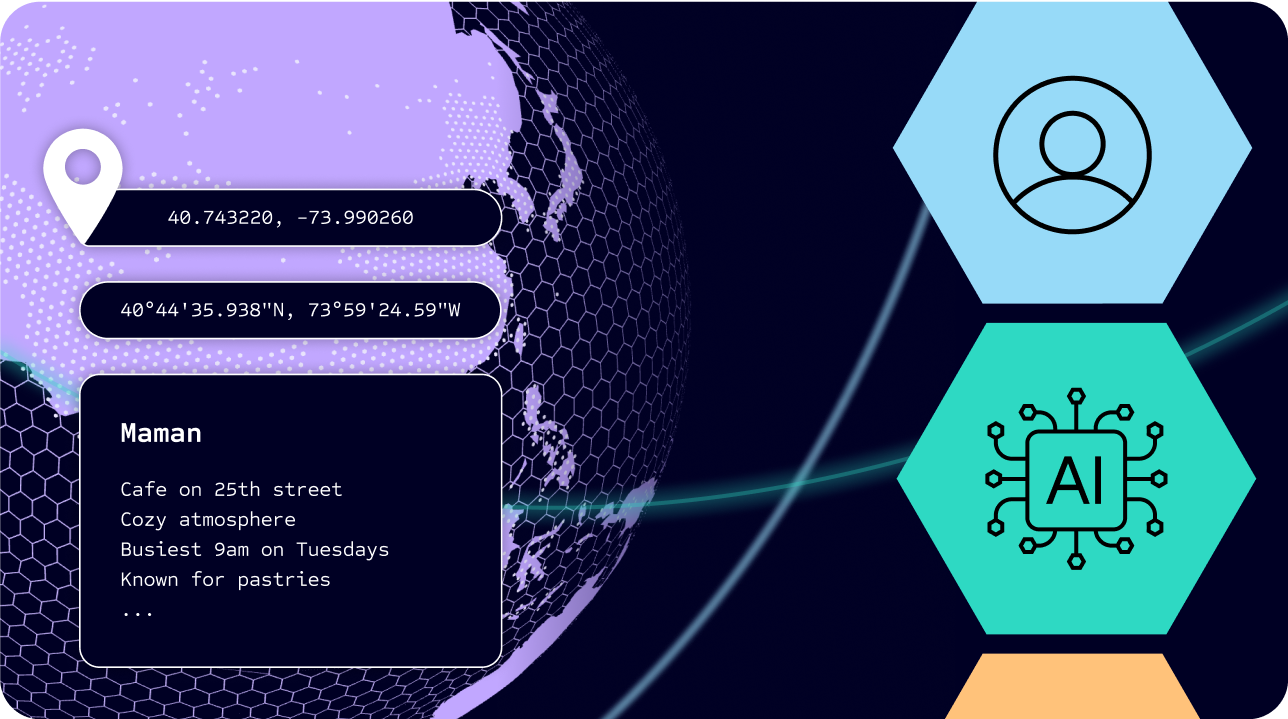Better points-of-interest (POI) data means better apps and user experiences. Foursquare’s Places API offers flexible access to the largest user-generated database of venue information in the world, with rich data representing 100+ million commercial POI. We do this by engaging our customers with contextualized digital experiences. Our Places dataset returns more detailed information than our competition thanks to having more categories to filter searches by (1,100+), more data attributes (60+), and more accurate geocodes, including rooftop, preferred drop-off location, and front door location.
In fact, 125K+ developers globally leverage our Places API to recommend top places nearby, display POI on maps, surface rich content such as photos and tips, autocomplete search features, and much more.
This fall, we challenged developers to unlock the power of Places by building their own geo-contextual experience in our Places API hackathon on Devpost.
Here’s how it worked: The developer community on Devpost signed up for a free Foursquare developer account to obtain access to our Places API. They were required to build or update a functional software application to create an engaging user experience using the Foursquare Places API, giving them a taste of how, what, and why developers globally use it. As the final step in the submission process, competitors posted a public video on their social media platform (e.g., YouTube, Vimeo, or Facebook) to explain and demonstrate their project in action.
The competition had 12 outstanding submissions from all around the United States. We’re excited to spotlight the top three winning developers’ impressive work:
Kenneth Rosas and Nicolas Baez’s OmniGrub Chrome Extension
First place prize goes to Kenneth Rosas, a medical records director, and Nicolas Baez, an investment banking associate, both based in New York City.
Kenneth has a bachelor’s degree in Computer Programming and Information Systems from Farmingdale State College, and recently earned a Computer Software Engineering certificate from Fullstack Academy. Growing up in the days of 56k modems – and seeing how much the internet bloomed – piqued his fascination with the developer world. With nearly a decade in the healthcare industry and an academic background fine tuned for development, Kenneth is looking to be part of the bridge between technology and people.
Nicolas has a bachelor’s in Hotel Administration from Cornell University, and also recently graduated from Fullstack Academy. He has worked in various investment banking teams at Societe Generale over the past four years, currently focused on equity capital markets. Nicolas’ passion for programming came when he started learning about decentralized finance and blockchain in 2021. He’s excited about building in Web3.0 using Polkadot’s blockchain framework, Substrate.
For our competition, they developed OmniGrub to address the problem of having to check multiple review websites for restaurant ratings. They came up with the idea of a simple Chrome extension that activates when people are looking at a specific restaurant on DoorDash. Once activated, it displays the Foursquare and Yelp ratings of this restaurant directly on the DoorDash page.
This extension extracts the address of the restaurant, which is hidden inside the DOM tree unless a user manually presses the ‘more info’ button, and its name to query Foursquare Places API. This information is then sent to the script in charge of making the API calls. Within this script, a call is made to AWS lambda to receive the API keys for Foursquare Places and Yelp Fusion. Afterward, the information extracted from the DoorDash page will be matched to the search queries required to make the API calls. OmniGrub will then receive an API JSON object and use DOM manipulation to manually insert stylized HTML based on the results.
Jeffrey Kozik’s Music Super App for Businesses, mywaves.xyz
Another top contender was Jeffrey Kozik. He is a software engineer at GitHub based in Columbus, Ohio. Jeffrey recently received his bachelor’s degree in Computer Science from Case Western University, and has participated in eight hackathons on Devpost to date.
Jeffrey proposed mywaves.xyz, a music super app for businesses. This app can analyze music, showing how many customers check-in through Swarm/Foursquare within three minutes of each song playing, as well as how much revenue is generated. This allows businesses to identify which songs generate the most engagement and revenue, and make better decisions about what music to play that their community enjoys! Customers can also create their own mywaves.xyz account, which they can connect to their Spotify and Swarm/Foursquare accounts. With this feature, when a customer checks-in to a location that is using mywaves.xyz, their favorite songs are automatically requested. Additionally, customers can search the area around them and see which songs are currently playing at every location using mywaves.xyz. This provides a more immersive experience than simply seeing pictures and reviews about a location because music gives good insights into the atmosphere of the restaurant/store. Lastly, it offers a Music Map API feature in which third party developers can query locations by their Foursquare ID to see what song is currently playing at that location.
The mywaves.xyz app was built using Foursquare API, Ruby on Rails, Heroku, Postgresql, Square API, Spotify API and Soundtrack Your Brand API.
Rishav Raj Jain, Aditya Jain and Eric Sanchez’s Estate Expert App
This team proposed the idea of Estate Expert, an app that helps you find the perfect house in an easy few clicks process. Savvy real estate teams are utilizing location technology to maintain a competitive edge, deriving accurate, timely insights to capitalize on recent trends and reap the rewards. Meanwhile, there are remote workers who are searching for places with better access to certain sites (e.g., gym and park). With these two situations in mind, Estate Expert is the perfect combination that solves these needs. Once a consumer signs up for the app, they are able to see all listings through the search tab and check further details. This app was built using Flutter, an open source toolkit along with the Foursquare API to search for places nearby.
Honorary Mention submissions
Besides the top three winners, we are excited to announce the following honorary submissions according to each category:
- Best Data Analysis: mywaves.xyz
- Best Visualization: FSQ-Insights
- Best Mobile App: Outside
- Best Web App: DayTrip
- Best Student: Swottle
- Best Use of Unfolded SDK: Travelscape
- Best Business Value: Estate Expert
- Best Utility: OmniGrub
The takeaway
The breadth of innovation presented by the Devpost community demonstrates how Foursquare’s Place API is powering developers to create apps with location searches rich in detail – with photos, reviews, tips, and more. Congratulations to our winners and thank you to all those who participated!
Curious how else to utilize the Foursquare Places API? Learn how we can build a local search map.



